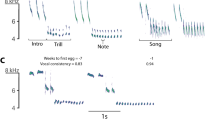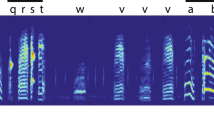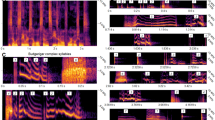Abstract
HARTSHORNE1,2 has suggested that a relationship exists between the degree of versatility and continuity in bird song. According to this view, singing which is relatively continuous, with pauses between successive songs relatively short when compared with the length of the song, would tend to be highly monotonous unless successive utterances were variable in pattern.
This is a preview of subscription content, access via your institution
Access options
Subscribe to this journal
Receive 51 print issues and online access
$199.00 per year
only $3.90 per issue
Buy this article
- Purchase on Springer Link
- Instant access to full article PDF
Prices may be subject to local taxes which are calculated during checkout
Similar content being viewed by others
References
Hartshorne, C. Auk, 73, 176–192 (1956).
Hartshorne, C., Born to Sing (Indiana University Press, Bloomington, 1973).
Ibid., 125.
Hartshorne, op. cit., 176.
Wildenthal, J. L., Auk, 82, 161–189; 167–168 (1965).
Lemon, R. E., and Chatfield, C., Anim. Behav., 21, 28–44 (1973).
Marler, P., and Isaac, D., Condor, 62, 124–135 (1960).
Lemon, R. E., Z. Tierpsychol. (in the press).
Lasiewski, R. C., in Avian Biology 2 (edit, by Farner, D. S., and King, J. R.), 287–342 (Academic, New York, 1972).
Borror, D. J., Ohio J. Sci., 59, 347–56 (1959).
Reynard, G. B., Living Bird, 2, 139–148 (1963).
Borror, D. J., Condor, 74, 80–86 (1972).
Thompson, W. L., Behaviour, 31, 261–287 (1968).
Marler, P., and Tamura, M., Condor, 64, 368–376 (1962).
Borror, D. J., and Gunn, W. W. H., Auk, 82, 26–47 (1965).
Barber, D. R., Nature, 163, 129 (1959).
Marler, P., Ibis, 94, 458–472 (1952).
Marler, P., and Isaac, D., Wilson Bull., 73, 193–206 (1961).
Stein, R. C., Auk, 73, 507–512 (1956).
Borror, D. J., Ohio J. Sci., 64, 195–207 (1964).
Fish, W. R., Condor, 55, 250–257 (1953).
Marler, P., and Isaac, D., Auk, 77, 433–444 (1960).
Kroodsma, D. E., Condor, 73, 303–308 (1971).
Lemon, R. E., Can. J. Zool., 46, 1163–1169 (1968).
Heckenlively, D. B., Condor, 73, 24–36 (1970).
Lemon, R. E., and Herzog, A., Condor, 71, 1–15 (1969).
Mulligan, J. A., Proc. 12th int. Orn. Congr., 272–284 (1963).
Schubert, M., J. Orn., 108, 265–294 (1967).
Borror, D. J., Auk, 73, 211–229 (1956).
Thompson, W. L., and Jane, P. L., Jack-Pine Warbler, 47, 115–125 (1969).
Bremond, J. -C., C.r. hebd. Séanc. Acad. Sci. Paris, 259, 3365–3366 (1964).
Author information
Authors and Affiliations
Rights and permissions
About this article
Cite this article
DOBSON, C., LEMON, R. Re-examination of monotony threshold hypothesis in bird song. Nature 257, 126–128 (1975). https://doi.org/10.1038/257126a0
Received:
Accepted:
Issue Date:
DOI: https://doi.org/10.1038/257126a0
This article is cited by
-
Sexual selection for both diversity and repetition in birdsong
Nature Communications (2023)
-
Song-type switching rate in the chaffinch carries a message during simulated intrusion
Behavioral Ecology and Sociobiology (2020)
-
Blue-winged warblers (Vermivora pinus) ?recognize? dialects in type II but not type I songs
Behavioral Ecology and Sociobiology (1984)
-
Structure and evolution of song form in the wrens Thryothorus sinaloa and T. felix
Behavioral Ecology and Sociobiology (1979)
-
Continuity and versatility in bird song: support for the monotony–threshold hypothesis
Nature (1978)
Comments
By submitting a comment you agree to abide by our Terms and Community Guidelines. If you find something abusive or that does not comply with our terms or guidelines please flag it as inappropriate.



